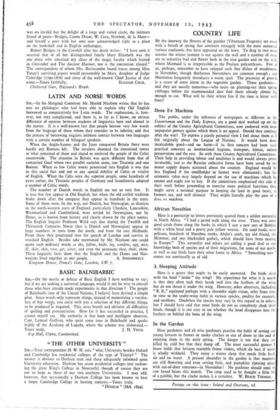LATIN AND NORSE WORDS
Sift,—In his Marginal Comment Mr. Harold Nicolson writes that he has met no philologist who had been able to explain why Old English borrowed so comparatively -few Latin words. The explanation, is, how- ever, not very complicated, and there is, as far as I know, no serious difference of opinion between students of linguistics here and abroad in the matter. It is a well-known fact that people borrow very few words from the language of those whom they consider to be inferior, and that the process of borrowing requires intimate contact between two languages with a certain number of bilingual speakers.
When the Anglo-Saxons and the Jutes conquered Britain there were hardly any Romans left. The invaders shunned the romanised towns or what remained of them and stayed or enslaved the people of the Celtic countryside. The situation in Britain was quite different from that of romanised Gaul where two parallel societies arose, one Teutonic and one Roman. When so few Celtic words penetrated into English it was due to this social fact and not to any special debility of Celtic or vitality of English. When the Celts were the superior people, some hundreds of years earlier, the Teutonic peoples of Germany and Scandinavia adopted a number of Celtic words.
The number of Danish words in English are not so very few. It is true that few appear in Old English, but when the old scribal tradition broke down after the conquest they appear in hundreds in the texts. Some of them were, by the way, not Danish, but Norwegian, as districts in the north-western parts of England, particularly Cheshire, Lancashire, Westmorland and Cumberland, were settled by Norwegians, not by Danes, as is known from history and clearly shown by the place names. The English linguist Professor Wyld says that during the Twelfth and Thirteenth Centuries Norse (that is Danish and Norwegian) appear in large numbers in texts from the north, and from the east Midlands. From there they penetrated into the speech of London and survive in standard English. Besides take mentioned by Mr. Nicolson one could quote such ordinary words as sky, fellow, knife, leg, window, egg, awe, ill, skirt, skin, root, get, sister, and even the pronouns they, their, them. These linguistic facts show that the English and the Danes and Nor- wegians lived together as one people. A. SOMMERPELT. Kingston House, Prince's Gate, London, S.W.7.


























 Previous page
Previous page